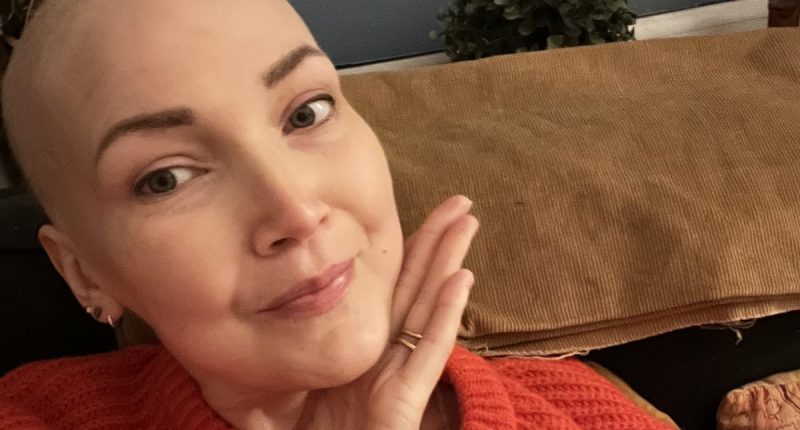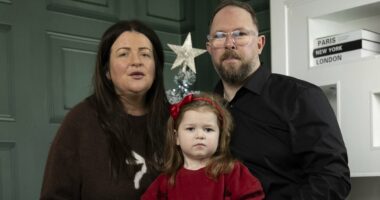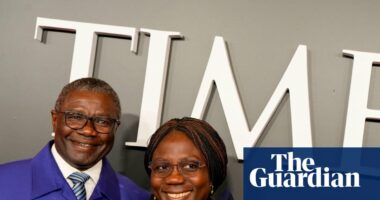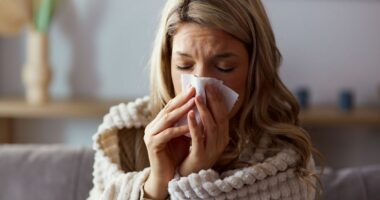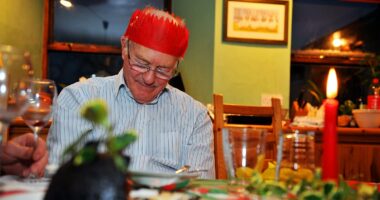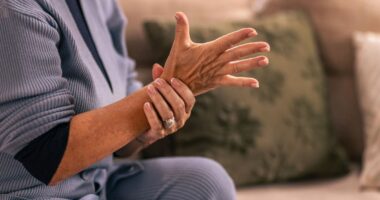Share this @internewscast.com
A young cancer patient who has run out of treatment options has warned those under 50 never to assume they’re ‘too young’ for cancer—after doctors dismissed her symptoms for three years due to her age.
Lea Hughes, now 38, first spotted a small lump on her right breast aged 29, in 2015.
But the former fashion marketer was told by her GP, on several occasions, that she ‘didn’t qualify’ for further testing due to her young age and the fact no one in her family had suffered cancer.
Doctors instead told her she just had ‘lumpy breasts’, known medically as fibrocystic tissue.
This is harmless, bumpy, tender breast tissue that arises as a result of hormonal fluctuations triggered by the menstrual cycle.
However, three years later, in 2018, she noticed another worrying symptom.
‘I was putting a bikini on and I saw a shadow and a dimple [on my breast],’ she said.
‘When I explained it to doctors on the phone, they referred me straight to the hospital.’

Lea Hughes, 38, first spotted a small lump on her right breast aged 29 but was reassured her ‘lumpy boobs’

Lea Hughes was told the devastating news she had stage four cancer that was incurable
Ms Hughes, from The Wirral, underwent a mammogram and ultrasound scan, followed by a biopsy on the dimpled lump.
Doctors delivered the devastating news that the breast lump was cancer, and performed further tests to see if the disease had spread throughout her body.
‘They did full body scans—MRIs, PETs and bone scans,’ she said. ‘They learned it had spread to my liver and bones.
‘I was diagnosed with stage four incurable cancer in a matter of weeks in April 2018 on Friday 13th, of all days.’
Drug treatments managed to keep the cancer under control for a number of years, and in June 2022, she underwent a single mastectomy, followed by chemotherapy.
The combination of treatment kept the disease stable for two years, until a routine scan in August 2024 showed her liver tumours had began to grow.
Further imaging revealed that the cancer had also spread to her brain.
‘With stage four breast cancer, you know it can spread to the brain and you do worry,’ said Ms Hughes.

Lea Hughes in hospital during radiotherapy treatment after being diagnosed with stage 4 cancer
‘But I didn’t expect it then, because I had no symptoms at all.’
In September 2024 she started whole-brain radiotherapy, followed by another round of chemotherapy.
A further blow came in March this year, when she began suffering breathing difficulties.
Tests revealed the cancer has spreas to her lungs, resulting in a build-up of four and a half litres of fluid, which doctors had to drain during a risky procedure.
Now, Ms Hughes is midway through her sixth course of chemotherapy.
She is fundraising to access a targeted cancer drug called Enhertu, which is not widely available on the NHS for women with her type and stage of cancer.
Without NHS funding, it can cost over £10,000 per cycle.
‘I always try to lean into the positive…accepting how sh***y this is, but also not giving in,’ she said. ‘But it does feel very real when things don’t work.

Lea Hughes receives cancer treatment in hospital after being diagnosed with stage 4 cancer

Lea who was diagnosed with incurable cancer wearing a cold cap during chemotherapy treatment
‘I can’t believe everything I’ve been through. You don’t realise until you sit back and reflect.
‘But I have no choice just to get on with it and keep fighting.’
It comes amid an explosion of cancers in young people, which has baffled experts.
In the UK, about 2,400 women aged 39 and under will be diagnosed with the disease each year, according to the charity Breast Cancer Now.
But those statistics mask a creeping, upward trend. In 2023, a US study found that cancers of all types were on the rise for younger women—but curiously not men.
While for women they increased overall by more than four per cent, for young men there was a dip of almost five per cent.
A study published that year in the British Medical Journal Oncology, found that globally early-onset cancers rocketed by 79.1 per cent between 1990 and 2019.
Breast cancer made up not just the largest number of these cases, but the largest portion of deaths from any form of cancer in under-50s.
